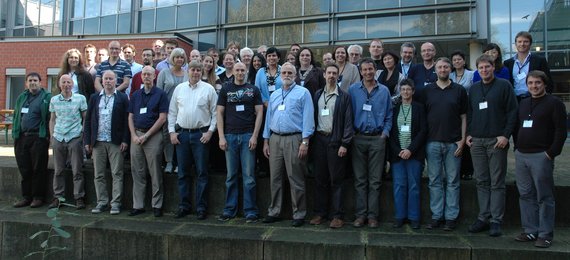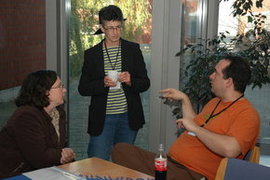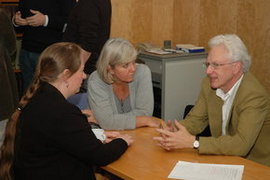Page path:
- Press Office
- Press releases 2011
- 13.10.2011 International research consortium se...
13.10.2011 International research consortium sets new standards for genome research
The 12th meeting of the Genomic Standard Consortium (GSC) took place at the Max Planck Institute for Marine Microbiology from September 28, till September 30, 2011. The goal of the GSC is to standardize the description of genomic data and to facilitate multidisciplinary data exchange and networking.

On three challenging days the participants of the 12th GSC workshop met in satellite meetings, attended status and flash talks and working sessions to discuss about the standardisation and networking of genomic databases.
63 participants from 11 nations focused on the construction and networking of databases integrating environmental and metagenomic data. The development of such databases is crucial for scientists to manage the ever increasing amount of metagenomic data. The participants of the workshop debated on the administration of this large amount of data and its coupling to the relevant physical and chemical environmental parameters. The goal of the bioinformaticists is to provide internet-accessible genome databases that enable researchers to analyse their data with a variety of tools, thereby gaining valuable information. The scientists further aim at setting standards for metagenome sampling according to which the data become comparable and exchangeable.
Not only microbiologists but also general biodiversity researchers, among them scientists of the Barcode of Life and the GBIF (Global Biodiversity Information Facility) initiative, that work on the resourcing of biodiversity data of higher animals and plants attended the meeting. The representatives from the distinc branches of biodiversity met for the first time with the aim to collaborate in order to facilitate the exchange of data from all three domains of life: Bacteria, Archaea and Eukarya.
A further highlight of the meeting were the contributions from the Earth Microbiome Project. For this project that maps the taxonomic and functional diversity of microbes data are already collected according to the new GSC standards (MIxS).
Not only microbiologists but also general biodiversity researchers, among them scientists of the Barcode of Life and the GBIF (Global Biodiversity Information Facility) initiative, that work on the resourcing of biodiversity data of higher animals and plants attended the meeting. The representatives from the distinc branches of biodiversity met for the first time with the aim to collaborate in order to facilitate the exchange of data from all three domains of life: Bacteria, Archaea and Eukarya.
A further highlight of the meeting were the contributions from the Earth Microbiome Project. For this project that maps the taxonomic and functional diversity of microbes data are already collected according to the new GSC standards (MIxS).
In between the talks the participants had plenty of time for inspiring discussions.
Two satellite meetings on two actual EC projects in which the Max Planck Institute for Marine Microbiology is involved preceded the international GSC workshop. In the next work package of the EuroMarine project experts from different biodiverstity research areas plan to develop methods that enable scientists to link the samples to contextual (environmental) data from the point of collection.
The second EC project BioVeL that started in September 2011, deals with the establishment of a virtual laboratory for the analysis of biodiversity data. The goal is to generate a platform in which scientists without special training can evaluate their biodiversity data according to scientific standards.
Rita Dunker
The second EC project BioVeL that started in September 2011, deals with the establishment of a virtual laboratory for the analysis of biodiversity data. The goal is to generate a platform in which scientists without special training can evaluate their biodiversity data according to scientific standards.
Rita Dunker


